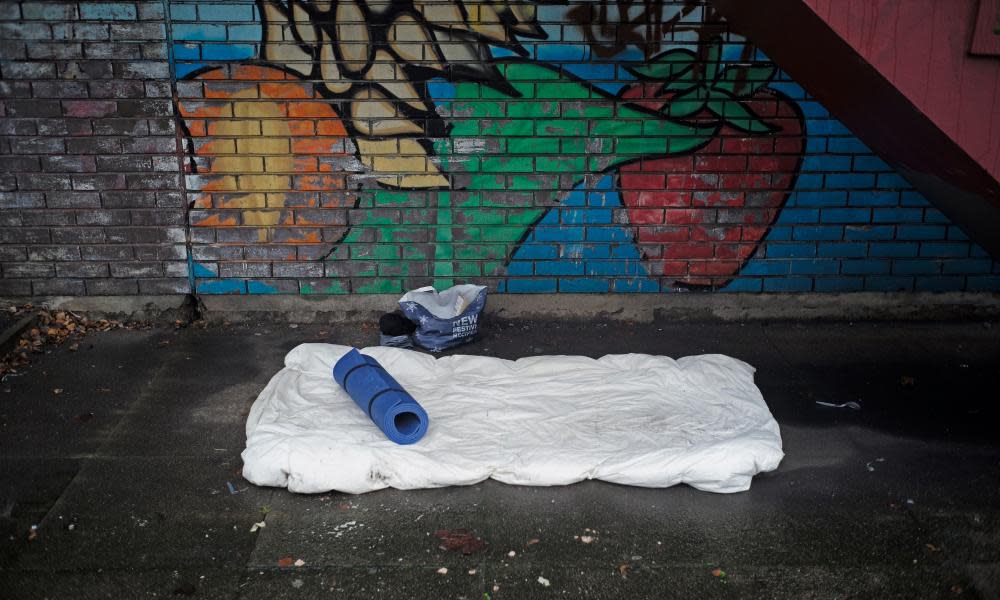Old habits are leading us astray on homelessness | Beth Watts

Street homelessness has increased dramatically since 2010. More than 8,000 people slept on the streets of London last year, more than double the number in 2009–10.
Local council counts and estimates indicate an even bigger increase (132%) across England. News of horrifyingly frequent deaths on the streets in London, Glasgow, Belfast and other UK cities is the starkest evidence possible that reversing these trends is essential to safeguard the lives of an extremely vulnerable group of people.
If a silver lining to this catastrophe can conceivably be found, it is perhaps that a growing group of people feels compelled to do something to help. Good intentions are not enough, however. In fact, they can have damaging consequences if misdirected.
Compelling evidence now tells a clear story about how to improve the prospects of those who end up on the streets most effectively: provide support that is tailored to the individual, persistent, flexible, and coordinated with other support services. Give people swift access to normal housing, and the support required for them to maintain it. Don’t concentrate those who have experienced homelessness together and separate them from mainstream society. Channel people’s strengths and interests rather than just focus on their problems. Directly address the material hardship that underpins their situation, not just the challenging behaviours sometimes associated with rough sleeping.
Many responses to homelessness cut against these lessons. Overwhelming evidence now demonstrates that Housing First – not last – is highly effective at keeping vulnerable rough sleepers off the street. But most rough sleepers must still navigate through transitional placements before accessing normal housing. En route, they are supposed to become “housing ready” ie to exhibit the life skills presumed necessary to maintain normal housing. The often large-scale accommodation projects are anything but home-like, however. The prevalence of violence, abuse and exploitation in such contexts is well documented. And many organisations still fail to account for the impact of experiences of trauma on those they try to help.
That ineffective models endure reflects the legacy of past ways of working, not bad intentions. But services must be prepared to take seriously the considerable gap between a lot of current practice and evidence on what works.
They need to ask whether current ways of working accord with the evidence and whether effective mechanisms for monitoring outcomes – and learning from that monitoring – are in place. Do current ways of working reflect intuition or habit, or what an impartial application of evidence would suggest? Adopting effective approaches will often require overcoming inertia and existing cultures of provision, as well as a commitment to navigating genuine practical and financial challenges, particularly in a context, as charity Crisis has pointed out, in which funding is under enormous strain.
If the legacy of past ways of working is one barrier to effective practice, the naivety of some well-intentioned “new” responses is an equally important challenge. Community-led and entrepreneurial responses to rough sleeping often develop in complete isolation from evidence and existing expertise. A series of street deaths in Belfast during the winter of 2015–16, for instance, prompted “pop-up” responses from members of the public seeking to give food and assistance to those on the street. These efforts had the entirely unintended consequence of drawing vulnerable individuals away from existing outreach and support services.
Reversing the startling trends in rough sleeping seen in recent years means ensuring that services are effective. Researchers and sector experts must be relentless in communicating what works, and prepared to call out bad practice where they see it. Policymakers, commissioners, charities, churches, social entrepreneurs and anyone else that wants to get involved should be willing to hear these messages, and act on them. Responses to rough sleeping should be based on evidence, rather than hubris, habit or mere good intentions.
Beth Watts is a research fellow at Heriot-Watt University and author of this year’s annual Homelessness Monitor.
Sign up for your free Guardian Housing network newsletter with comment and sector views sent direct to you on the last Friday of the month. Follow us:@GuardianHousing

 Yahoo News
Yahoo News 
